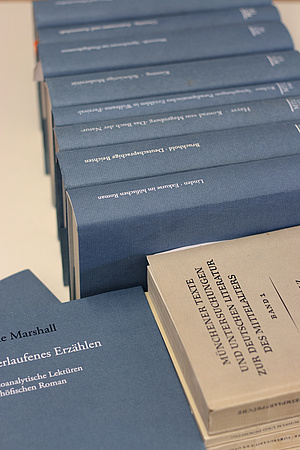The series of publications of the MTU

Over the past fifty years, the MTU series with its diverse programme has been playing an outstanding role in the discourse concerning Old German literature.
The importance of the methodological approach taken by the MTU is well recognised. Examples of this include acknowledgement of BRUCHHOLD’s research into German-language confessions in the 13th and 14th century (MTU 138), which is considered to be‘excellent work that creates a new basis for analysis of this central group of texts from the late Middle Ages’: „ganz vorzügliche Arbeit … unsere Kenntnis dieser von der Forschung bisher wenig beachteten, gleichwohl für die Frömmigkeitspraxis der Menschen des Spätmittelalters zentralen Textgruppe auf eine neue Basis“ (Germanistik 52, 2011, S. 209).
Although the approach of the MTU focuses clearly on tradition history, the series nevertheless remains open to other groundbreaking methods of text analysis. It is recognised, for instance, that the contribution to the series by UNZEITIG (MTU 139), which deals with her research into medieval authorship ‘sets new standards’:”einen Beitrag zur Erforschung mittelalterlicher Autorschaft vor, der Maßstäbe setzt“ (Arbitrium 32, 2014, S. 32), And it is noted that SEEBER (MTU 140) in his work on the phenomenon of laughter in medieval poetry delivers a ‘desideratum of research’:”ein Desiderat der Forschung“(ZdPh 133, 2014, S. 442). There is praise, too, for SEIDL (MTU 141) whose examination of the narrative strategies surrounding the medieval legends of Saint George, the knight, as being ‘profound and of methodical clarity: „profund und in methodischer Klarheit mit den narrativen Strategien der Aushandlung von Ritterschaft und Heiligkeit in der Georgslegendarik“ (PBB 136, 2014, S. 517).
